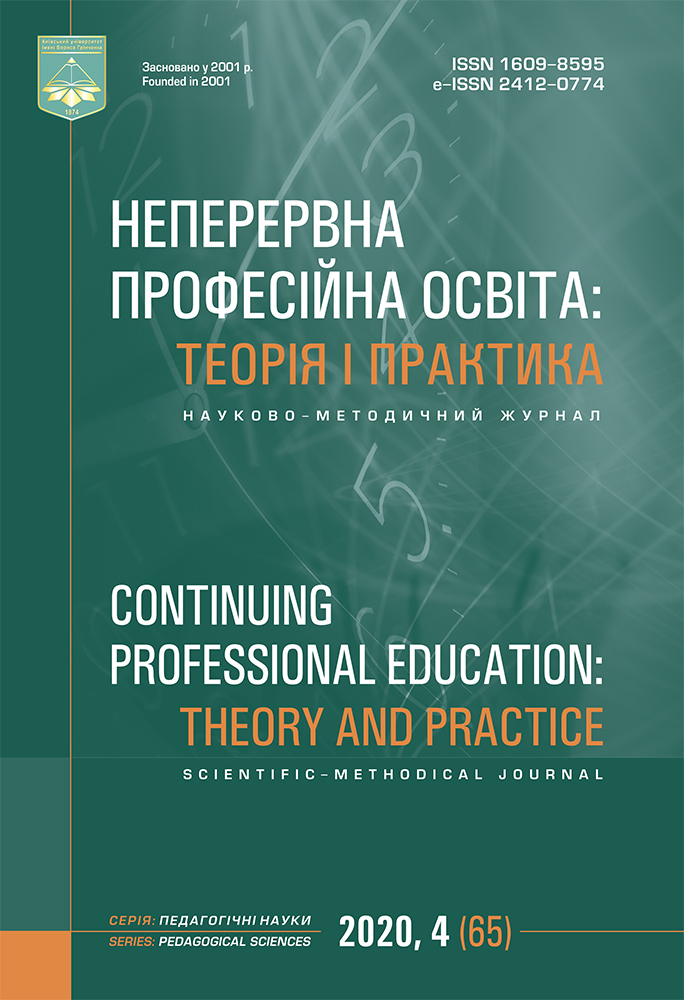ACADEMIC STAFF DEVELOPMENT PROGRAMME: RESEARCH COMPETENCE FORMATION
DOI:
https://doi.org/10.28925/1609-8595.2020.4.3Keywords:
academic staff development programme, efficiency, higher education, Research module, research knowledge, research skills, research competenceAbstract
The article is devoted to the study of the effectiveness of Academic staff development programme to promote the development of research competence. Mixed method (qualitative and quantitative) was used to explore the problem: the analysis of scholarly literature searching for the term «research competence» as well as modelling structural components of research competence. Research competence is seen in our article as an integrated personal and professional quality of a higher education teacher, which reflects the motivation for scientific research, the level of teaching research methodology, the personal qualities of a researcher, such as innovative thinking, the capacity for creativity and innovation. We have identified the following key components of the Research competence of a higher education teacher: motivational and valuable, cognitive, procedural and active, information, communicative, personal and creative, reflexive; components of research competence form a holistic unity of the results of academic staff professional and personal development. The article presents the experience and results of the implementation of the research module of Academic staff development programme at the Borys Grinchenko Kyiv University. The results showed that participation in the Research modules had influenced much to develop some components (the motivational and valuable, communicative, the personal and creative) of research competence in Academic staff. While learning Research modules university teachers can assess the current level of their research knowledge and skills and take responsibility for their continued professional development.References
Bertoncelj, A. (2010). Managers’ Competencies Framework: A Study of Conative Component. Economic Research-Ekonomska Istraživanja, 23 (4), 91–101. https://doi.org/10.1080/1331677X.2010.11517435
Berg, N. van den (2016). Boundary-crossing competences of educators and researchers in working on educational issues. In: M. Kantola, F. De Jong, M. Willemse, I. Berghmans (guest-eds.), EAPRIL special issue: UAS-Journal, 4. https://uasjournal.fi/in-english/boundary-crossing-competences-of-educators-and-researchers-in-working-on-educational-issues1/
Bilal, Guraya, S. Y., & Chen, S. (2019). The impact and effectiveness of faculty development program in fostering the faculty’s knowledge, skills, and professional competence: A systematic review and meta-analysis. Saudi journal of biological sciences, 26 (4), 688–697. https://doi.org/10.1016/j.sjbs.2017.10.024
Blašková, M., Blaško, R., & Kucharčíková, A. (2014). Competences and Competence Model of University Teachers. Procedia – Social and Behavioral Sciences, 159, 457– 467. https://doi.org/10.1016/j.sbspro.2014.12.407
Byrne, M. W. & Keefe, M. R. (2002). Building research competence in nursing through mentoring. Journal of Nursing Scholarship, 34 (4), 391–396. https://doi.org/10.1111/j.1547-5069.2002.00391.x
Cedefop. (2014). Terminology of European education and training policy. 2nd edition. A selection of 130 key terms. http://www.cedefop.europa.eu/files/4117_en.pdf
Hemmings, B., & Hill, D. (2009). The development of lecturer research expertise: Towards a unifying model. Issues in Educational Research, 19 (1), 14–24.
Ismail, R., & Meerah, T. (2012). Evaluating the Research Competencies of Doctoral Students. Procedia – Social and Behavioral Sciences, 59, 244–247. https://doi.org/10.1016/j.sbspro.2012.09.271
Kumar, R. (2019). Research methodology: A Step-by-Step Guide for Beginners. SAGE Publications Ltd.
Laudel, G. & Gläser, J. (2008). From apprentice to colleague: The metamorphosis of early career researchers. Higher Education, 55 (2), 387–406. https://doi.org/10.1007/s10734-007-9063-7
Providing researchers with the skills and competencies they need to practice Open Science. Open Science Skills Working Group Report (2017). Publications Office of the European Union. https://doi.org/10.2777/121253
Schwartz, S. H. (2009). A theory of cultural value orientations: Explication and applications. Comparative Sociology, 5 (2–3), 137–182. https://doi.org/10.1163/156913306778667357
Sondari, M. & Tjakraatmadja, J. & Bangun, Yu. (2016). Modeling Research Competency of Faculty Member: A Preliminary Data. Sains Humanika. https://doi.org/10.11113/sh.v8n1-2.837
The Law of Ukraine «On Higher Education» (2014, July, 01). The Verkhovna Rada of Ukraine; Law № 1556-VII. http://erasmusplus.org.ua/en/higher-education-in-ukraine.html
Thomas, A. B. (2004). Research skills for management studies. Routledge.
Antoniuk, L. L., & Vasylkova, N. V., & Ilnytskyi, D. O., & Kulaha, I. V., & Turchaninova, V. Ie. (2016). Kompetentnisnyj pidhid u vyshhij osviti: svitovyj dosvid [Competency approach in higher education: world experience]. KNEU.
Golovan, M. S., & Yatsenko, V. V. (2012). Sutnist ta zmist ponyattya «doslidnyczka kompetentnist» [Essence and maintenance of concept «research competence»]. Teoriya ta metodyka navchannya fundamentalnykh dyscyplin u vyshhij shkoli, VII, 55–62.
Krasilnikova, O. (2018). Kompetentnisnyj pidhid yak osnova filosofiyi osvity [Competency-based approach as a basis of educational philosophy]. Visnyk KNTEU, 1, 147–156.
Rozanova, V. A. (1999). Metodika diagnostiki motivacii k dostizheniju uspeha T. Jelersa [Technique of diagnosing motivation to achieve the success of T. Ehlers]. In Psihologija upravlenija (pp. 105–106). Alfa-Press.
Rogov, E. I. (1999). Nastolnaya kniga prakticheskogo psihologa [Handbook of a practical psychologist]. VLADOS. Book 1: Sistema raboty psihologa s detmi raznogo vozrasta.
Sysoieva, S. & Kozak, L. (2016). Doslidnyczka kompetentnist vykladacha vyshhoyi shkoly: programa rozvytku [Research competence of higher education teacher: program of development]. Neperervna profesijna osvita: teoriya i praktyka (seriya: pedagogichni nauky), 1–2, 39–44. https://doi.org/10.28925/1609-8595.2016(1-2)3944
Strel’nikov, V. (2011). Komponenty profesiynoyi kompetentnosti vykladacha vyshchoyi shkoly [Professional competence components of higher education teacher]. Gumanitarnyj visnyk, 28, 278–285.
Fetiskin, N. P, & Kozlov, V. V., & Manuilov, G. M. (2002). Socialno-psihologicheskaja diagnostika razvitija lichnosti i malyh grupp [Socio-psychological diagnosis of personality development and small groups]. Izdatelstvo Instituta psihoterapii.
Chaychenko, N. N., & Ptashenchuk, O. O. (2016). Pedagogichni umovy formuvannya doslidnyczkoyi kompetentnosti majbutnix uchyteliv biologiyi [Pedagogical conditions of formation of research competence of future teachers of Biology]. Science and Education a New Dimension. Pedagogy and Psychology, IV (46), Issue 97, 25–29.
Yaroshenko, O. (2018). Vitchyzniani i zarubizhni praktyky rozvytku doslidnytskoi kompetentnosti naukovo-pedahohichnykh pratsivnykiv v umovakh intehratsii vyshchoi osvity i nauky [Domestic and foreign practices of development of research competence of academic and pedagogical workers in the conditions of integration of higher education and science]. In O. Yaroshenko (Ed.), Teoretychni osnovy i tekhnolohiia profesiinoho rozvytku naukovo-pedahohichnykh pratsivnykiv universytetiv v umovakh intehratsii vyshchoi osvity i nauky: preprynt (analitychni materialy). Instytut vyshchoi osvity NAPN Ukrainy, Ch. 2 (pp. 48–67). https://ihed.org.ua/publications/
Downloads
Published
How to Cite
Issue
Section
License
Copyright (c) 2020 Svitlana Sysoieva, Iryna Sokolova

This work is licensed under a Creative Commons Attribution-NonCommercial 3.0 Unported License.



